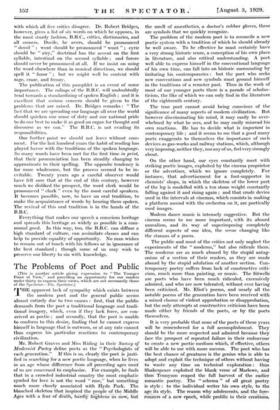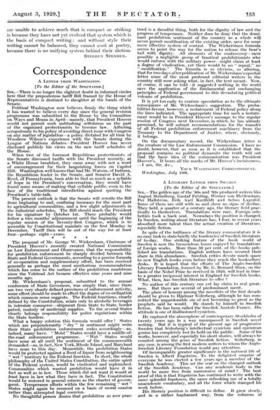The Problems of Poet and Public
[This is another article giving expression to " The Younger Point of View," and providing an opportunity for our readers under thirty to express their views, which are not necessarily those of the Spectator.—ED. Spectator.] THE apparent lack of sympathy which exists between the modern poet and the general public seems almost entirely due to two causes : first, that the public demands from the poet a traditional language and tradi- tional imagery, which, even if they lack force, are con- ceived as poetic ; and secondly, that the poet is unable to conform to this desire, finding that he cannot express himself in language that is outworn, or at any rate cannot thus express his particular- reactions to contemporary civilization.
Mr. Robert GraVes and Miss Riding in their Survey of Modernist Poetry define poets as the " Psychologists of each generation.", , If this is so, clearly the poet is justi fied in searching for a new poetic language, when he lives, in an age whose difference from all preceding ages most of us are concerned to emPhasize. For example, he finds that in a crowded industrial country the most emphatic, symbol for love is` notthe word " rose," but something much more closely associated with Hyde Park. The blanched skeleton that inspired the people of the Middle Agei With a fear of death, hardly' frightens us rioW, but the smell of anwsthetics, a doctor's rubber gloves, these are symbols that we quickly reCognize.
The problem of the modern poet is to reconcile a new poetic system with a tradition of which he should already be well aware. To be effective he must certainly have a very strong historic sense, a conception of his own place- in literature, and also critical understanding. A -poet well able to express himself in the conventional language of his own time, can fall into an historic surrounding by imitating his contemporaries : but the poet who seeks new conventions and new symbols must ground himself in the traditions of a remoter past. Thus in the work of most of our younger poets there is .a parade of scholas- ticism, the like of which we can only find in the literature of the eighteenth century.
The true poet cannot avoid being conscious of the significance of many aspects of modem civilization. But however discriminating his mind, it may easily be over- whelmed by what he sees, and he may easily misread his own reactions. He has to decide what is important in contemporary life ; and it seems to me that a good many poets exaggerate to themselves the importance of such- devices as gas-works and railway stations, which, although very imposing, neither they, nor any of us, feel very strongly about.
On the other hand, our eyes constantly meet with striking poetic images, exploited by the cinema proprietor or the advertiser, which we ignore completely. For instance, that advertisement for a foot-supporter in chemists' shops, in which the skeleton of the lower part of the leg is modelled with a ten stone weight constantly falling against it and rising again ; and that crude device used in the intervals at cinemas, which consists in making a platform ascend with the orchestra on it, are poetically used images.
Modern dance music is intensely suggestive. But the cinema seems to me more important, with its absurd unrealism, and its way of superimposing completely different aspects of one idea, the scene changing like the stanzas of a poem.
The public and most of the critics not only neglect the experiments of the " moderns," but also ridicule them. The moderns are as much abused by the stupid antag- onism of a section of their readers, as they are made absurd by the stupid adulation of another section. Con- temporary poetry suffers from lack of constructive criti- cism, much more than painting, or music. The Sitwells are poets who have been much ridiculed, excessively' admired, and who are now tolerated, without ever haVing been criticized. Mr. Eliot's poems, and nearly all the notable poems of the generation have been received with a mixed chorus of violent approbation or disapprobation, but the only attempts at constructive criticism have been' made either by friends of the poets, or by the poets themselves.
It is very probable that none of the poets of these years will be remembered for a full accomplishment. They should be the more respected and admired because they face the prospect of repeated failure in their endeavour to create a new poetic medium Which, if effective, others will be able to use with more success. The poet who has the best chance of greatness is the genius who is able to adopt and exploit the technique of others without having to waste any time on technical exploratiOn thus Shakespeare exploited the blank verse of Marlowe, and thus: Tennyson reaped the full harvest of the earlier romantic poetry. The " schema " of all great poetry is style : to the individual writer his own style, to the age its style. The reason why adolescents, and the fore- runneri of a new epoch, while prolific in their creations. are unable to achieve much that is compact or striking is because they have not yet evolved tha-t system which is the basis of compact writing : and without style their writing cannot be balanced, they cannot work at poetry, because there is no unifying system behind their diction.
STEPHEN SPENDER.



































 Previous page
Previous page